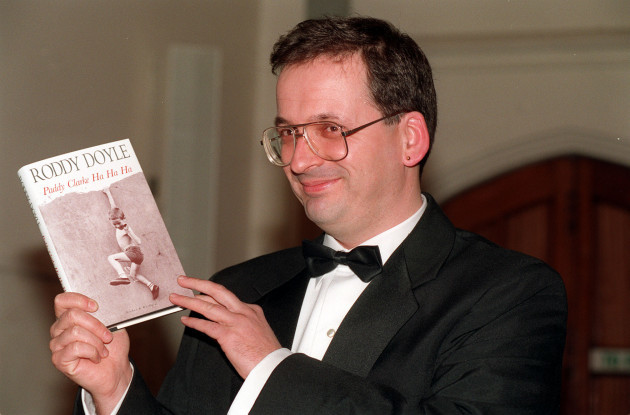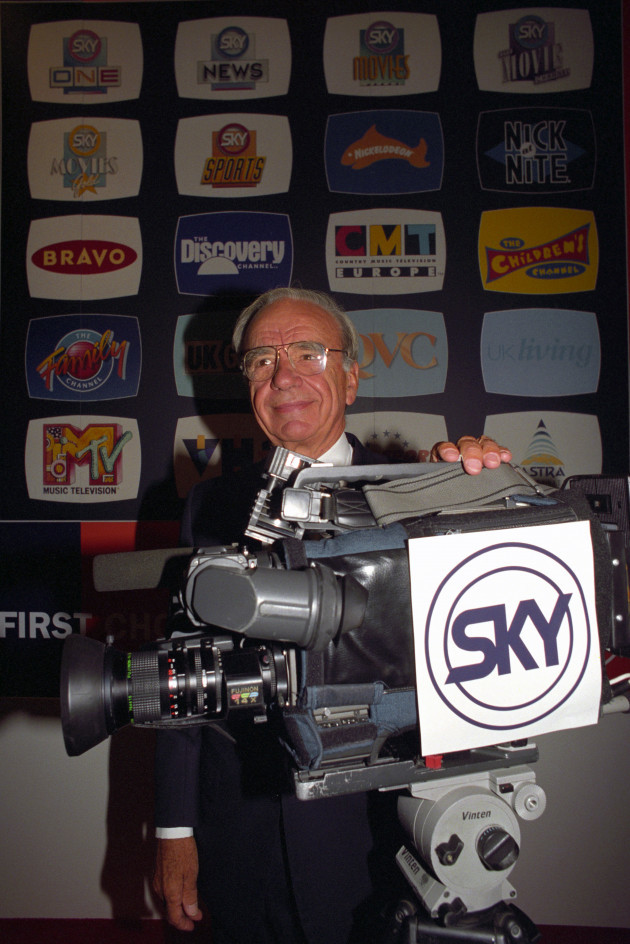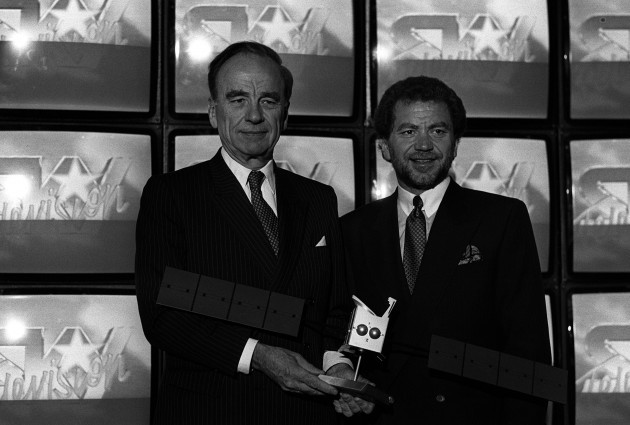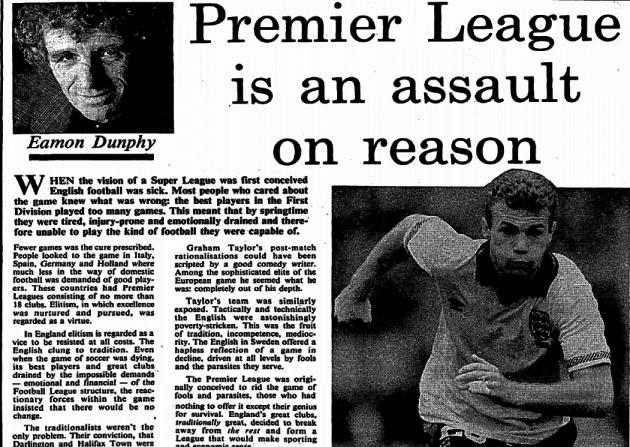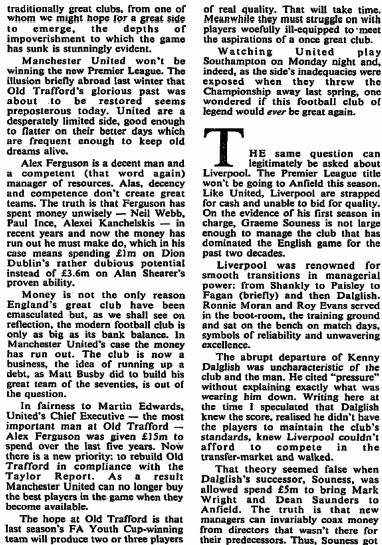THE ESTABLISHED ORDER was broken.
A new, different way of doing things was taking Ireland, the UK, even North America by storm.
There was only show in town grabbing all the attention.
Purists fumed, and Roddy Doyle was the one bearing the brunt of criticism.
On a publicity tour of Toronto in August 1992, the former Dublin school teacher-turned literary genius was doing some public readings of his latest work in progress, “Paddy Clarke” (the Ha Ha Ha must have been added later).
Following on from the success of “The Commitments”, “The Snapper”, and “The Van”, Doyle was in Canada and happy to escape those sneering at home.
‘Writer of the people Roddy laughs off the book snobs’ was one headline.
“Four people in Dublin who constitute the literary establishment have decided that I am not an author of literature,” he lamented.
“I should not be writing books which people read… I don’t tend to get a break from many of the critics over there. The Irish Times was particularly hostile to ‘The Van’. I guess I’m not part of the literary community.
“I write popular novels and the word popular is very bad.”
This was not the case at BSkyB’s original offices at St Stephen’s Green in Dublin, where they were processing some 2,000 orders a week to sign up for the company’s newest product.
Just a couple of weeks before the inaugural Premier League season got underway, Rupert Murdoch’s firm signed the £304 million deal to show 60 live games during the 1992/93 campaign.
The Irish public were quick to get on board.
Sky’s Tom Rice, who was instrumental in the company’s move here, insisted that “Irish pubs with a football clientele, can’t do without it.”
The birth of the barstooler, some might sigh.
For homes, the Sky dish made by Alan Sugar’s company Amstrad cost £250, with an installation fee on top and the initial monthly subscription of £2.99.
Cablelink could also supply the service for £9.99 a month and were reporting 150 installations a day before the season got underway.
And yet, the FAI and League of Ireland clubs could have scuppered the flagship Super Sunday from ever being shown on Irish television screens.
Instead, a deal was thrashed out that appeased all.
On Wednesday, 26 August, the specially-appointed FAI/LOI TV Committee met at 5pm in Merrion Square to go over some of the final details.
Under Uefa Article 14, the FAI could object to Sky Sports’ Sunday broadcasts, unless compensation was offered, as they clashed with the domestic League fixtures.
During the previous season, the association attempted to block Sky broadcasting a number of Scottish fixtures, but the Scottish FA had already accepted and were unwilling to part with any of the money they received.
Instead, some League of Ireland games were moved to midweek from what was described as “the lucrative Sunday market.”
A precedent, of sorts, was set.
Thirty years later and the manner of the agreement with Murdoch now seems so ridiculously quaint – Sky Sports spreading a payment of £1.5 million equally between all 22 League of Ireland clubs at the time over five years in order to help improve their facilities.
The installation of floodlights was the core objective for most as the process of moving domestic games from their Sunday afternoon slot to Friday nights was put in motion.
Shelbourne already had them at Tolka Park, and had switched to night games en route to winning the 1991/92 title, while Dundalk, UCD and, of course, Bohemians at Dalymount Park were the only clubs already boasting such a facility.
“We tried to do what was best for the clubs, that would allow us to try and offer something different to be able to compete,” Eddie Cox, former Bray Wanderers chairman and a member of that joint FAI/LOI TV Committee, tells The42.
Cox was joined by Shels’ chairman Ollie Byrne, Des Casey at Dundalk, Dr Tony O’Neill from UCD and Bohs’ Brendan Duffy.
“We got a deal, basically, to put floodlights into grounds. The feeling was a Friday night would be better as we’d have the place to ourselves, there was no other real competition.
“There was no Gaelic Games, there was very little rugby because the professional game hadn’t started. It was just the Blackrocks and various others.
The money was to improve facilities as a whole but at the end of the day once clubs get that money you have no idea what they will do with it.”
The thriving TV market was already a source of welcome income for the FAI, who sold their five remaining home 1994 World Cup qualifiers to ITV for £750,000, and were able to top up that pot to over £1m by selling separately to markets in Spain and Denmark.
The sense among most was that the deal with Sky was not allowing the Trojan Horse in, and that building attendances through a change of scheduling could be achieved.
“In years to come, season 1992-93 may be known not only as the start of the FA Premier League and a boom in live TV football, but also the beginning of a new era for the League of Ireland. From big oak trees, little acorns fall,” Sean Ryan wrote in the Sunday Independent.
The League of Ireland was already in the midst of change, a sense of optimism flowing because of what was described as “a brave new format” that would see a 33-game top flight.
After two series of matches the top and bottom half would split, with respective play-offs determining the champions and relegation fodder.
Bord Gáis were the title sponsors of the league and gave the 92/93 season its own tag line: A season of challenge.
One of them, was to “provide skilful, exciting football for the supporters who leave their armchairs to see if local soccer is worth spending money to watch ‘live’.”
Once the Premier League arrived on Irish screens, the feeling from some was that it was actually too much football, and would turn viewers off who were more accustomed to the BBC’s “Match of the Day” on a Saturday night.
The 2-7pm time slot for Sky’s Super Sunday repeated the same highlights as shown on terrestrial TV the previous night, half-time was extended from 10 to 15 minutes (more ads brings more money), and while the permanent score line on the top left of the screen, and fans’ phone-in at the end of the show were deemed welcome additions, some were not convinced.
“Forget the babble about Sky, ITV, Italian football, satellite dishes, decoders and two live games a week. Match of the Day is shaping up as the one compulsive viewing football programme on the box,” Enda McEvoy wrote.
Match of the Day’s enduring popularity is perhaps the best indicator of how the consumer wants his football. In bite sized pieces; short, sweet, plenty of action, plenty of goals, easily digestible.”
The most acerbic of all commentators was, unsurprisingly, Eamon Dunphy. Although not for the reasons you might think.
“The Premier League is an assault on reason” and “Great clubs emphasise the game’s impoverishment” were headlines for columns in which the former Sunday Independent columnist lambasted the bloated new top flight.
Instead of 18 clubs as had been originally planned, 22 made up the first three seasons before it was belatedly trimmed to 20.
“It is an absurd imposter. Nothing has changed for the better. The truth is it represents profound defeat for those who sought radical change.
“The great clubs who tried to breakaway have failed. They remain imprisoned by the mediocrities they must support.
“It is a future with no great clubs, no great managers or players, a future in which the spoils will belong to competent tacticians like George Graham and Howard Wilkinson rather than dreamers like Shankly, Busby and Bill Nicholson.
“The game is gone. There is no need to whisper anymore. Just watch the once great clubs.”
Thirty years on Sky’s impact has been seismic, yet Super Sunday might never have made it to Irish screens had League of Ireland clubs not been blinded by the prospect of new floodlights.


